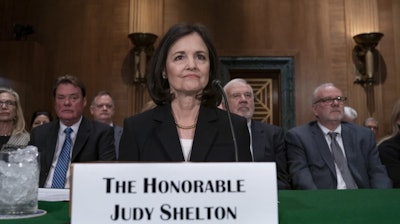
WASHINGTON (AP) — President Donald Trump's unorthodox choice for the Federal Reserve Board of Governors, Judy Shelton, could be approved by the Senate next week, Majority Leader Mitch McConnell's office said Thursday.
The willingness of the Senate GOP leadership to bring Shelton's nomination to the floor indicates that they likely have the votes to approve her for the central bank's board. Her selection stalled in September when Sen. Jon Thune, a member of the Senate leadership, said that she didn't have sufficient support.
Sen. Lisa Murkowski, Republican from Alaska, said Thursday she would support Shelton, after previously refusing to disclose her position. GOP Sen. Mitt Romney from Utah has said he is opposed to Shelton's nomination. Republicans currently have a 53-47 majority.
Shelton's path to Senate approval may have been eased by Joe Biden's victory in the presidential election. When Trump first announced her selection in 2019, many analysts noted that if she became a Fed governor and Trump won reelection, he could nominate her to replace Jerome Powell, the current chair, whose term expires in February 2022. Now that Trump has lost his reelection bid, there is no prospect for Shelton to become chair, which may have made it easier for GOP senators to support her nomination.
Shelton, a conservative economics commentator, has run into stiff opposition from Senate Democrats, most economists, and many former Fed officials for her past support of the gold standard and for writings that questioned the Fed's political independence. Under the gold standard, the U.S. dollar's value is tied to gold. Under that approach, the Fed has had less leeway to adjust interest rates, even in a severe recession.
Shelton was approved by the Senate Finance Committee on a 13-12 party-line vote in July. Senate Democrats criticized her for appearing to flip-flop on many positions, including near-zero interest rates. She opposed ultra-low rates during President Barack Obama's presidency but supported them after President Donald Trump took office and demanded that the Fed lower its short-term benchmark rate.
As a member of the Fed’s powerful board of governors, Shelton would vote on the Fed’s rate decisions and on banking regulation. The governors also vote on whether to institute emergency measures, such as the Fed’s decisions in March to start buying corporate bonds for the first time and institute a raft of programs to bolster financial markets.
Still, on her own, it’s unlikely that Shelton would have much effect on Fed policy, economists have pointed out. The central bank operates by consensus and Fed governors rarely dissent from interest rate decisions, though Fed bank presidents do. For now, the Fed has pegged its benchmark rate to nearly zero and Fed officials have said they expect it to remain there until at least 2023. Shelton has been picked to fill a term that expires in 2024.






















